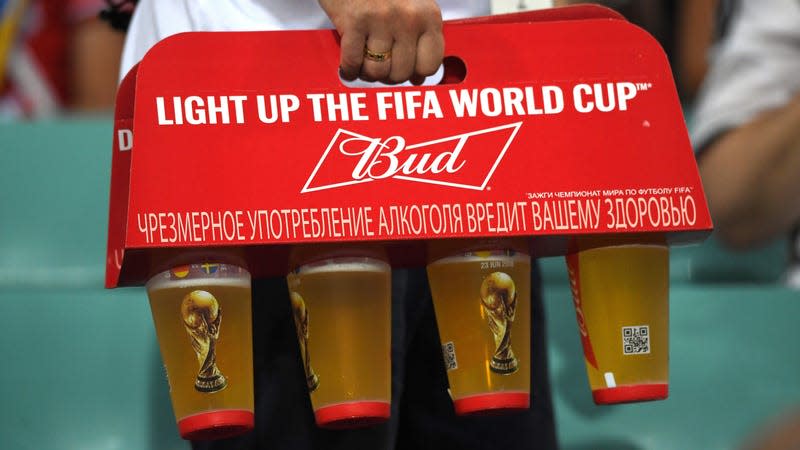The 2022 World Cup Might Be Beerless

Sports and beer go hand in hand, so much so that major breweries are often the biggest sponsors of major athletic events. Bud Light and the NFL, Michelob ULTRA and the NBA, Heineken and MLS—these partnerships make themselves known with signage and logos splattered across the stadiums and broadcasts, not to mention the concessions sold at the games. There’s nothing a sponsor wants more than to have a crowd of thousands enjoying their product, labels prominently displayed for the broadcast.
Since 1985, Budweiser has been the beer official sponsor of the FIFA World Cup, paying (in recent years) around $75 million every four years for the title, The New York Times reports. But this year the relationship between the World Cup and Budweiser could be at risk due to a last-minute request from officials in Qatar, where the month-long tournament is set to start this Sunday, November 20. The beer tents at the eight World Cup stadiums must be moved from inside the venue to outside, and fans will not be allowed to take beer into the stadium—taking away a huge amount of visibility for Budweiser and removing access for fans.
Read more
Why Qatar is restricting World Cup beer sales
Back in 2010, the Fédération Internationale de Football Association (FIFA) announced that Qatar would host the 2022 World Cup, ostensibly giving organizers 12 years to figure out how to balance the league’s commitment to one of its biggest sponsors with the Muslim nation’s strict guidelines surrounding alcohol. Yet according to The New York Times, it wasn’t until this past Friday, just eight days before the tournament’s first game, that the official mandate was passed down from the Qatari state (allegedly from members of the country’s royal family, according to anonymous sources) and in turn communicated to Budweiser.
Anonymous sources tell The New York Times that the last-minute decision was due to concerns that the prominence and visibility of alcohol at stadiums throughout the month would make the local population uncomfortable and cause a security risk. While Qatar is not a completely dry country, it has strict guidelines under which alcohol may be consumed, mostly restricted to bars associated with high-end hotels. The entirety of Qatar’s drinking culture is aimed to appease tourists, not meet demand for locals.
Budweiser seemed aware that its association with the World Cup would drastically alter Qatar’s drinking culture—just last week, a representative for Bud told Fortune that they expected more beer would be consumed in Qatar in just the one month surrounding the World Cup than in a typical year in the country. But there are a few Qatari laws that would seem to set up such a prediction for failure.
For one, public drunkenness is illegal, except within the confines of one of those aforementioned hotel bars. Unfortunately, public drunkenness often goes hand in hand with sports fandom. The country also has a ban on alcohol advertising, likely another reason Budweiser’s branded beer tents must be moved into a less prominent position around the World Cup stadiums.
According to The New York Times, FIFA officials agreed to move the beer tents in order to ease any tensions that might otherwise cause the beer tents to be removed entirely. It seems entirely possible that a last-minute edict to ban all booze could still come down the pipe, based on how haphazardly many of this year’s World Cup decisions appear to have been made. And if that does happen, FIFA will have an even bigger challenge on its hands: keeping Budweiser happy enough to stick around for the 2026 World Cup hosted across Mexico, the United States, and Canada. At least Budweiser can count on the fact that those three nations will take no issue with brewskis flowing freely.
More from The Takeout
Sign up for The Takeout's Newsletter. For the latest news, Facebook, Twitter and Instagram.

